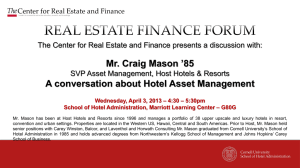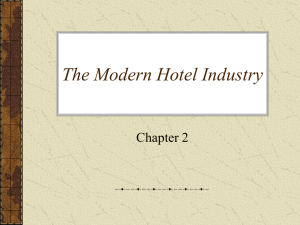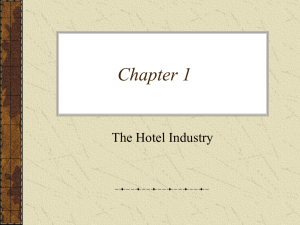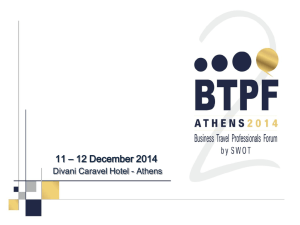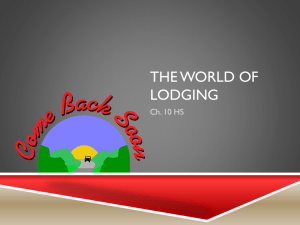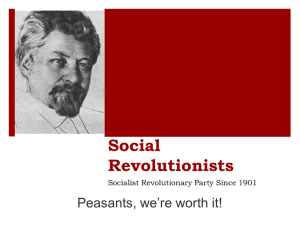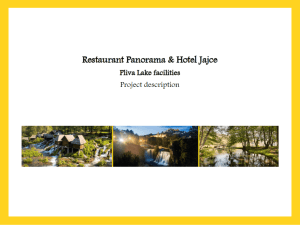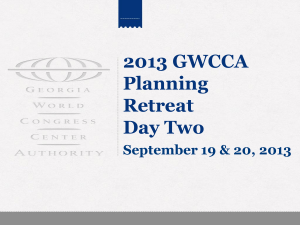Tourism and hospitality industry potential of Russia
advertisement
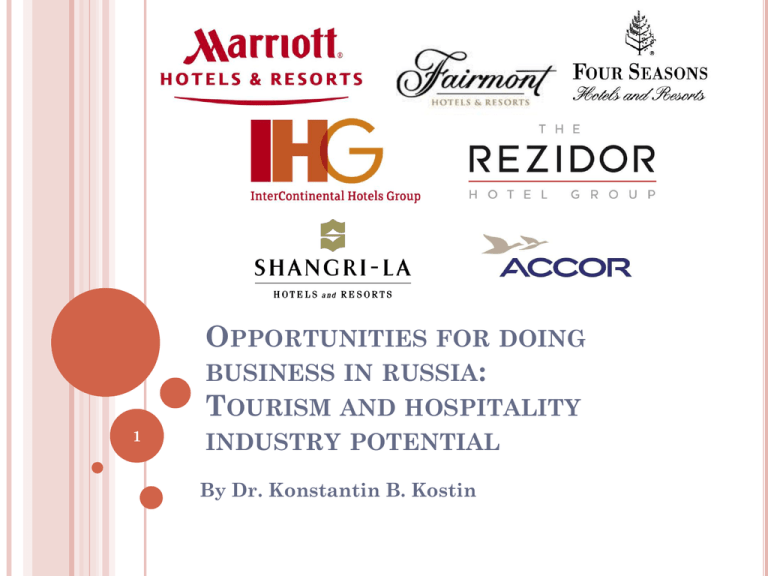
OPPORTUNITIES FOR DOING BUSINESS IN RUSSIA: TOURISM AND HOSPITALITY 1 INDUSTRY POTENTIAL By Dr. Konstantin B. Kostin TOURISM AND HOSPITALITY INDUSTRY IN RUSSIA 2012: 128 new hotels (over 40 000 rooms) under construction and development 2011: occupancy rate 57,7%, +5% Average daily room rate (ADR) RUB 4896,88 (+3,8%) Revenue per available room RUB 2 872,90 (+9%) 2 3 KEY FIGURES 4 5 KEY FIGURES 6 7 KEY FIGURES 8 9 10 TOURISM AND HOSPITALITY INDUSTRY IN RUSSIA Hospitality industry is developing & market is growing Infrastructural development Amount of customers Average nights spent in hotels Increasing room rates International brands More expensive hotels Additional hotel services 11 INDUSTRY LIFE CYCLE: HOSPITALITY Sales ($) Stage III Moderate Stock cash dividends dividends and splits Low cash Expansion dividends Stage II Stock dividends Stage I No cash dividends Stage IV High cash dividends Maturity Stage V High Dividend Payout Ratio and then no dividends Decline Growth Development Development Stage I Growth Stage II Expansion Stage III Maturity Stage IV Decline Stage V Time TOURISM Over 22 million international tourists from 224 countries in 2010 (Federal Security Service of Russia) Russian authorities encourage Russian regions to attract investors Plan: doubling the hotel amount by 2025 North Caucasus area: mountain skiing 13 CURRENT ROOM SUPPLY STRUCTURE 14 FORECASTED ROOM SUPPLY STRUCTURE 15 HOTEL TYPES 16 HOTEL TYPES 17 HOTEL TYPES 18 19 20 21 WHAT ARE THE ADVANTAGES AND DISADVANTAGES FOR FOREIGN HOTEL CHAINS TO ENTER THE RUSSIAN MARKET? Advantages infrastructural development of the industry, number of guests grows industry in its growth phase has enough capacity for development Sochi Olympic games in 2014 Disadvantages high political and economic risks lack of skilled personnel terms and conditions of obtaining relevant permits authorizations for the construction of accommodation facilities 22 LARGEST DOMESTIC HOTEL CHAINS Russian companies: Azimut: Over 20 hotels in operation and under development with more than 5,500 rooms in Russia, Germany and Austria. Positioned in the most dynamic segment of the hospitality industry for business, leisure and group travel Heliopark: 8 hotels (located in Russia, Germany ), and 9 more projects are in the implementation stage. Strategy: compehensive Hotel Development Amaks hotel: Manages 21 hotels, located in the regions of the Russian Federation and Belarus 23 INTERNATIONAL HOTEL CHAINS IN RUSSIA Foreign companies: 24 LARGEST HOTEL CHAIN IN RUSSIA: REZIDOR 25 LARGEST INTERNATIONAL PRESENCE IN RUSSIA Rezidor: Currently, Rezidor manages 20 hotels in Russia The strategy of the group is to have more than 40 hotels with 10,000 rooms in operation Marriott Hotel & Resorts: Currently operates 19 hotels in Russia & CIS across six lodging brands The strategy of the group: more than 30 hotels open by 2015 Accor: Currently, Accor's network in Russia-CIS is 14 hotels (over 3500 rooms). The strategy of the group: reach a network of 50 hotels (over 10 000 rooms) in Russia-CIS by 2016 26 LARGEST GROWTH Hilton: The first Hilton Hotel in Russia was opened in 2008 Currently the group has 30 hotels (5638 rooms) under development in Russia. IHG: Currently has 16 hotels across Russia and the CIS including 11 hotels in Russia Continue to grow in Moscow and St. Petersburg and work with local investors to introduce managed and franchised hotels across the country. 27 PIPELINE IN RUSSIA 28 POPULATION 29 COMPETITION Increased demand for ”Boutique Hotels” Small hotels, boutique type are increasing their market share Example: St Petersburg Hostel 94% of people going on holiday this summer would consider hostel accommodation. Budget Other Airbnb Couchsurfing Homeholiday 30 ENTRY MODES Contract Management: 31 ENTRY MODES: END OF THE 90S WHAT ARE THE BEST ENTRY MODES AND PROS & CONS FOR THEM? Franchisee: System of permanent relations between a franchiser (hotel chain) and a franchisee (hotel property). Hence all the knowledge, marketing & promotion programs, brand image and success are used in return for mutual satisfaction of interests Advantages Coherent and clearly defined concept Functional business strategy Optimized and measurable financial and promotional results Business safety and sustainability Working tools and procedures with a high and guaranteed productivity Competitive marketing & sales programs Global distribution & sales systems, already tested and generating additional guest flux to the franchisee 33 WHAT COMPETITIVE ADVANTAGES DO FOREIGN HOTEL COMPANIES HAVE OVER RUSSIAN HOTEL BUSINESS? STRENGTS Money: Financing Quality Management system Knowledge of the market Network OPPORTUNITIES Open a new market (highquality economic-class hotel) Developing regions Cultural and World events Build up reputation (make greater profits) Great demand Limited competition Buy old buildings and renovate them, preferrably in city center. Revenue Management Russia has 14 cities over 1 million habitants WEAKNESSES Scarce skilled man-power Cultural differences Really new market (hard to estimate the real danger) THREATS Vague hotel qualification system State-owned old soviet Hotels, refurbished and kept by the government. Existing competitors (other big groups) 34 ENTERING STRATEGY, EXPECTED PAYBACK, REVENUE DRIVERS AND RISKS Investment in Russia The Russian hotel business is one of the most dynamic industries showing high annual growth 2011: the hotel service market grew by 12% in volume terms Market value increased by 22% and reached 144 billion rubles (3.5 billion euros or about $4.5 billion). PAYBACK PERIOD (PP) Expected PP varies by chosen market area (8-15years) GOP (gross operating profit) Europe varies from 3–4% to 10–12%, while in Russia it reaches 45–55%, although over the last 3 years it has steadily been going down due to growing salaries and taxes and decreasing incomes 35 36 HOTEL ACQUISITION Examples of hotel acquisition in Russia: Ritz Carlton Moscow (2011): 700 millions $ National Hotel Moscow: 165 millions $ Metropol Hotel Moscow: 300 millions $ Pekin Hotel: 60 millions $ 37 MARKETING Comprehensive Marketing analysis Knowing the customer needs Knowing the competitors Branding 38 REVENUE MANAGEMENT The primary aim of Revenue Management is selling the right product to the right customer at the right time for the right price. Data Collection Segmentation Forecasting Optimization Dynamic Re-evaluation 39 40 41 THANK YOU FOR YOUR ATENTION! 42
